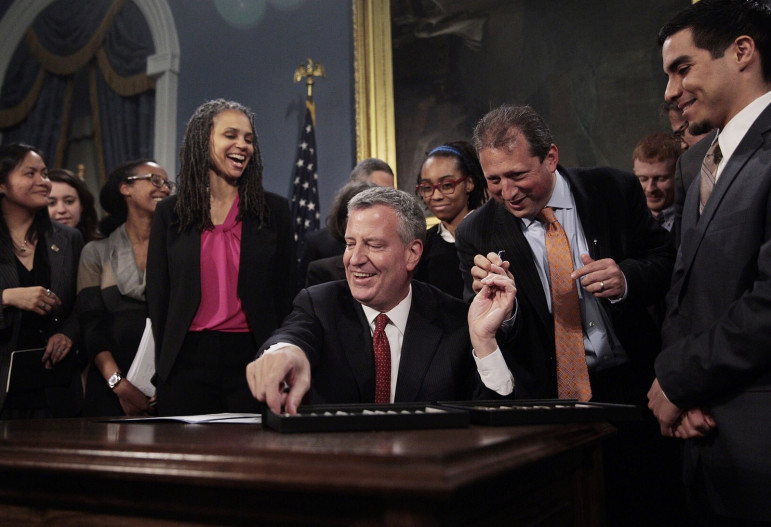
William Alatriste for the New York City Council
Mayor de Blasio signed the credit-check ban in May.
When the City Council moved earlier this year to ban credit checks in the hiring process, the discussion quickly turned from the pros and cons of the prohibition to the ins and outs of who would be covered by the law. Business groups called for a broad set of exemptions from the new statute. The Council adopted a far narrowed list.
Advocates like the NYC Coalition to Stop Credit Checks in Employment have hailed the law as “the strongest of its kind in the country.” But the law’s backers acknowledged that its true strength would only start to become clear when the city’s Human Rights Commission began to enforce it, which they did last Wednesday. While there’s no record of cases yet, the language of the commission’s interpretive enforcement guide suggests a very narrow reading of new statute.
For instance, the law allows businesses to consider an applicant’s credit history if state or federal law or the Financial Industry Regulatory Authority (FINRA) requires it.
But the commission says that even companies that have some workers who register with FINRA must adhere to the ban on credit checks when hiring other employees who do not have to register. The commission’s guidance also notes that the only state law requiring credit checks is one that applies to licensed mortgage loan originators.
Likewise, an exemption for police officers, peace officers and investigators at the city’s Department of Investigation will only apply to law enforcement officers—not civilian employees of enforcement agencies—or to DOI employees who actually work in investigations. The exemption doesn’t cover “operations and communications positions,” the commission says.
And under the law, hiring officers at city agencies are only allowed to learn applicants’ credit histories if the job they are applying to is appointed and the position involves “a high degree of public trust.” The commission defines “high degree of public trust” as limited to commissioners; assistant, associate, and deputy commissioners; highly placed counsel; chief information and technology officers and “any position reporting to directly to an agency head.”
The commission also chalks out some narrow readings of phrases in the law like “security clearance,” “trade secrets” and “intelligence information.” All told, one advocate says, the commission’s interpretation “ensures that the vast majority of jobs in NYC will be covered under the law.”








